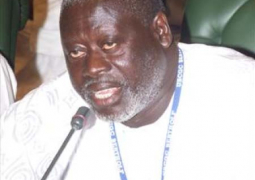Justice Moses Richards of the Special Criminal Court of the High Court in Banjul has said that should the state prosecutor fail to appear in court on the next adjournment date, he would allow the appellant's counsel to proceed with their appeal.
He made this pronouncement yesterday regarding an application for a stay of proceedings in the Femi Peters case at the lower court, which is before his court.
The application was filed by defence counsel Ousainou Darboe, on behalf of Femi Peters, who is the campaign manager of the opposition Untied Democratic Party (UDP).
Lawyer Darboe had applied to the high court for a stay of proceedings in the lower court, pending determination of the application before the high court.
It would be recalled that Femi Peters is standing trial at the Kanifing Magistrates' Court on charges of control of procession and the use of loudspeakers.
When the case was called before Justice Richards, the state counsel, Buba Bojang, informed the court that the deputy Director of Public Prosecutions, Mikailu Abdoullhi, was indisposed and could not attend the court.
"Your lordship am asking for an adjournment to enable me to inform the DDPP before the next adjournment date," state counsel Bojang said.
Defence counsel Ousainou Darboe reminded the court that, at the last adjournment date, the DPP who was supposed to handle the matter was not in court, and that his deputy held brief for him.
"Somebody wants to run away from this case, and I really want the appeal to proceed," Lawyer Darboe said.
According to him, the appeal was filed since November 2009 for a stay of proceedings in the lower court, "but there is no sign of relief, meaning that someone is running away from the appeal."
Lawyer Darboe then urged Justice Richards to intervene and put a stop to the proceedings in the lower court until the application before the high court was determined. He referred the court to some legal authorities.
The case was adjourned to 16 March 2010.
According to the notice of appeal, the appellant in this case was dissatisfied with the ruling of the Kanifing Magistrates' Court, presided over by Ikapala, dated 23rd November 2010.
The appellant, therefore, appealed to the high court based on the following grounds:
That the learned magistrate erred in law when he refused to refer the case to the Supreme Court for determination, the constitutional question formulated for reference;
That Section 127 of the Constitution makes it mandatory for any court to refer the matter when an application for such reference is made;
That Section 127 of the Constitution does not vest any discretion in any lower court, in which an application for reference to the Supreme Court is made.
That the learned magistrate erred in law when he held that he must be satisfied that a constitutional issue has arisen before he could refer any matter to the Supreme Court under Section 127 of the Constitution;
That by the said holding the learned magistrate embarked upon an interpretation of the Constitution, a matter reserved for the Supreme Court; and that this was in complete disregard of the provisions of Section 127 of the Constitution.
That the learned magistrate read into Section 127, a matter which the framers of the Constitution have excluded therefrom.
That the learned magistrate exceeded his jurisdiction when he in effect decided that he does not see how the Public Order Act is in conflict with the Constitution, and by so deciding usurped the interpretative jurisdiction and functions of the Supreme Court.
Read Other Articles In Article (Archive)



